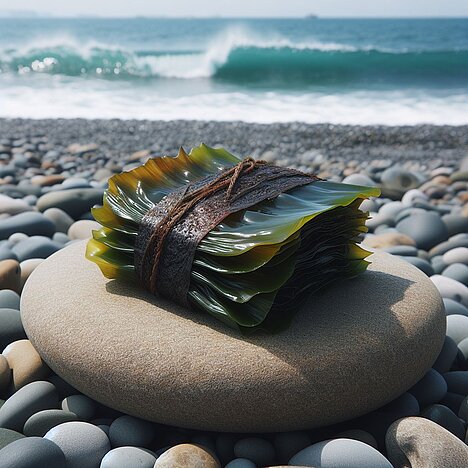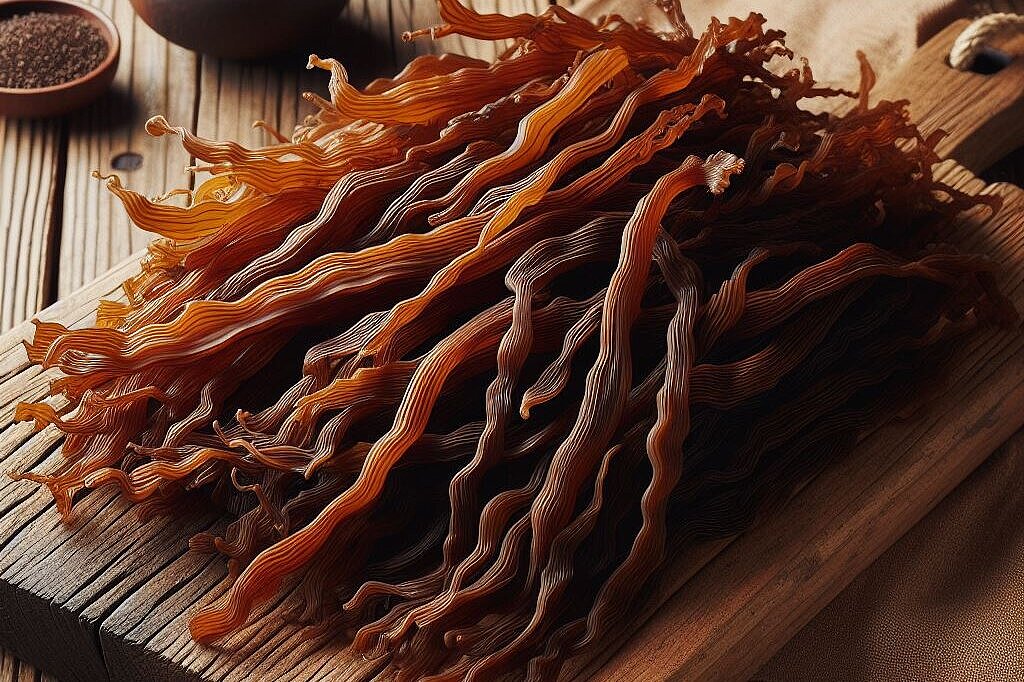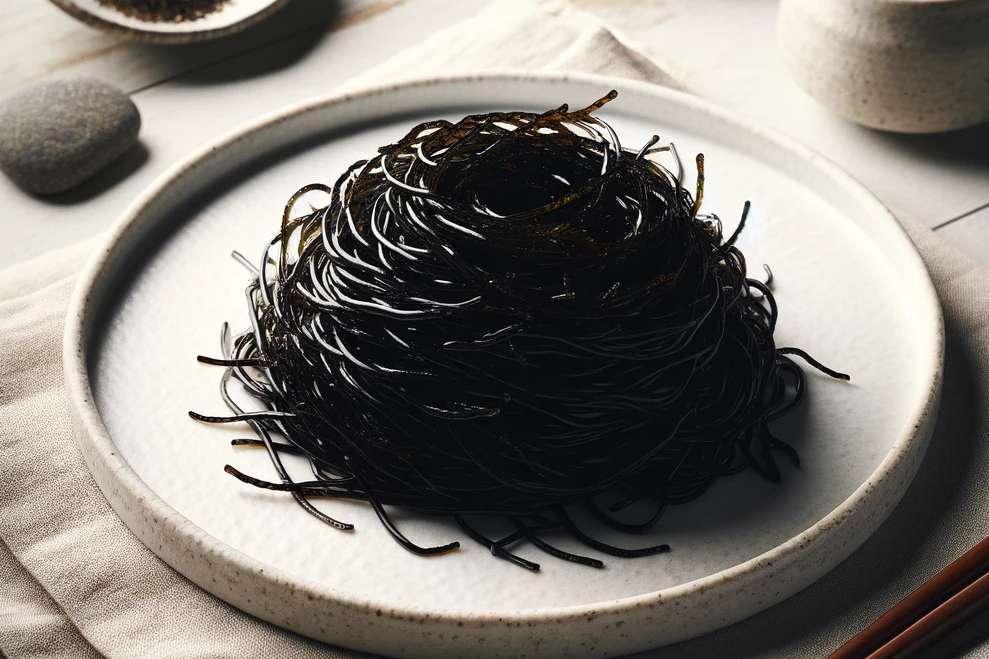Kombu

What is kombu?
Kombu is a brown algae that belongs to the genus Laminaria. It grows in cold seas and forms long, leathery leaves with finger-like appendages. Kombu is mainly cultivated and harvested in Japan, Korea and China, but there are also several species of kombu in Europe, both wild and cultivated.
Kombu is dried, cut or powdered and used as a spice or ingredient for soups, stews, salads or snacks. Kombu is a natural flavor enhancer that intensifies the umami note. Umami is the fifth sense of taste alongside sweet, sour, salty and bitter and is often described as savory or spicy.
Kombu contains many nutrients that are important for human and animal health. These include:
- Iodine: An essential trace element required for the production of thyroid hormones. These hormones regulate the body's metabolism, growth and development.
- Potassium: A mineral that is responsible for the function of nerves and muscles as well as the fluid balance in the body.
- Calcium: A mineral that is important for the formation and maintenance of bones and teeth as well as blood clotting and muscle contraction.
- Magnesium: A mineral that is involved in many enzymatic reactions in the body and is required for energy production, nerve function and muscle relaxation.
- Iron: A trace element responsible for the transportation of oxygen in the blood and the formation of red blood cells.
- Zinc: A trace element that is important for the functioning of the immune system, wound healing and the sense of taste.
- Vitamin B12: A water-soluble vitamin that is required for the formation of red blood cells, DNA synthesis and the function of the nervous system.
- Vitamin C: A water-soluble vitamin that is responsible for the formation of collagen, an important structural protein in connective tissue, as well as for the function of the immune system and protection against free radicals.
What are the benefits of kombu for dogs?
Kombu can have several health benefits for dogs when fed in moderation. These include:
- Improving digestion: kombu contains fiber, which can promote bowel movement and prevent constipation. Kombu also contains prebiotic substances that can support the growth of beneficial bacteria in the gut.
- Strengthening the immune system: Kombu contains antioxidants such as vitamin C and polyphenols, which can neutralize free radicals and prevent cell damage. Free radicals are reactive molecules that are caused by environmental factors or metabolic processes and can lead to inflammation and chronic diseases.
- Support thyroid function: Kombu is a good source of iodine, which is needed for the production of thyroid hormones. These hormones regulate the body's metabolism, growth and development. An iodine deficiency can lead to hypothyroidism, which can manifest itself in symptoms such as weight gain, hair loss, fatigue and sensitivity to cold.
- Promoting skin and coat health: Kombu contains omega-3 fatty acids, which have an anti-inflammatory effect and can strengthen the skin barrier. Kombu also contains zinc, which is important for wound healing and the sense of taste. A zinc deficiency can lead to skin problems such as dandruff, eczema or hair loss.
What are the disadvantages of kombu for dogs?
Kombu is not suitable for all dogs and can also have some disadvantages if fed in too large quantities or too frequently. These include:
- Excess iodine: depending on its origin and processing, kombu contains very high amounts of iodine, which can lead to hyperthyroidism. This can manifest itself in symptoms such as weight loss, nervousness, palpitations or diarrhea. Excess iodine can also impair the effect of medication used to treat thyroid disorders.
- Allergic reactions: Kombu can trigger allergic reactions in some dogs, which can manifest themselves in symptoms such as itching, skin rash, swelling or difficulty breathing. This can occur particularly in dogs that already have an allergy to fish or seafood.
- Heavy metal contamination: Depending on the location and water quality, kombu can accumulate heavy metals such as lead, mercury or arsenic, which are toxic to the body. These can accumulate in the body and lead to organ damage or neurological disorders.
- Risk of injury: Depending on its shape and size, kombu can pose a risk of injury to dogs. For example, large or hard pieces of kombu can get stuck in the throat or injure the esophagus. In addition, sharp edges of dried kombu can cut the gums or the oral mucosa.
How do you feed kombu to dogs?
If you want to feed kombu to your dog, there are a few points you should keep in mind to minimize potential risks and maximize the benefits. These include:
- Only buy high-quality kombu from trusted sources that ensure good water quality and gentle processing. Pay attention to information on the origin, iodine content and heavy metal content of the product.
- Soak dried kombu in lukewarm water before feeding to make it softer and easier to digest. Then rinse it with clean water to remove any excess salt or dirt.
- Cut or chop the kombu into small pieces to avoid the risk of injury. You can also pulverize it or buy it as flakes and mix it into the food.
- Only feed small amounts of kombu as a supplement to the normal food. The recommended daily intake for iodine is 220 micrograms per kilogram of body weight for dogs. As the iodine content of kombu can vary greatly, you should follow the manufacturer's instructions.
- Do not feed kombu every day, but only occasionally as a change or reward. This way you can prevent an overdose of iodine or heavy metals.
Kombu is a nutrient-rich brown algae from the Laminaria genus, which is mainly found in Asia and Europe. It is used dried, sliced or powdered in various dishes and is known for its umami taste. Kombu contains important nutrients such as iodine, potassium, calcium, magnesium, iron, zinc, vitamin B12 and vitamin C.
For dogs, kombu can provide health benefits such as improving digestion, boosting the immune system, supporting thyroid function and promoting skin and coat health. However, kombu should be fed in moderation as excess iodine, allergic reactions, heavy metal exposure or risk of injury can occur due to the firm consistency of kombu.
When feeding kombu to dogs, it is important to choose high-quality products, soak kombu before consumption, cut it into small pieces or pulverize it and give it in small quantities as a supplement to normal food. Iodine intake should be monitored to avoid overdosing.
If you notice any signs of hypersensitivity or poisoning in your dog, you should see your vet immediately. We are not a substitute for a vet, but we try to be as accurate as possible. Every dog reacts differently and we recommend you get a second opinion or consult your vet if in doubt.
Stay healthy and take good care of your four-legged friend!😊
Similar to Kombu
Wakame (Undaria pinnatifida) is a marine brown algae species that was originally native to the coasts of East Asia. However, due to its invasive nature, it has now spread to many other seas. Wakame...
Nori is a seaweed that grows in shallow waters. It is harvested, washed, pressed into thin sheets and dried. Nori has a dark green color and a mild taste. It is rich in protein, fiber, minerals and...
Arame (Eisenia bicyclis) is a dark brown seaweed that is mainly found in the cold waters around Japan. It is characterized by its fine, thread-like strands, which develop a sweetish note after...
Hijiki (Sargassum fusiforme) is a seaweed known for its long, thread-like fronds that can grow up to several meters in length. After harvesting, hijiki is dried and then forms small, hard pieces...



